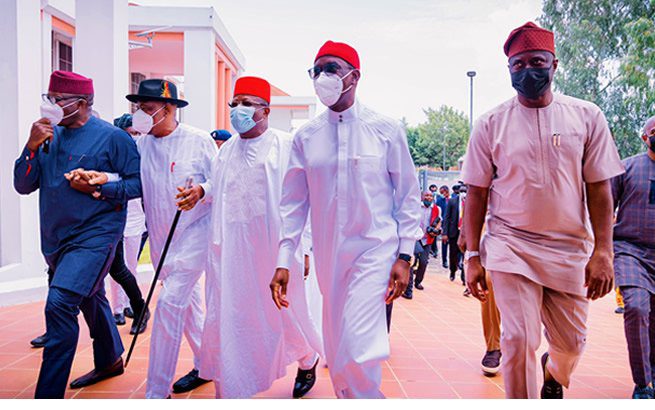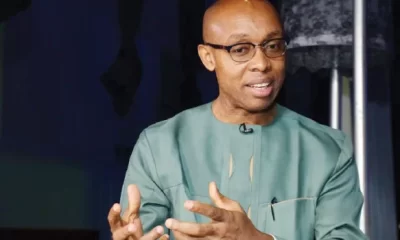National Issues
Restructuring: Asaba Accord and the Debates within the Debate -By Wealth Dickson Ominabo

On 11th May, 2021, governors in the Southern part of Nigeria- comprising the three zones of South-East, South-West and South-South gathered in Asaba, the Delta State capital to discuss the state of the nation. The meeting followed weeks of sustained anxiety in the country amid collapsing state of insecurity and violence in some parts of the country.
After hours of deliberations, Governor Rotimi Akeredolu of Ondo State read out the resolution of the Southern Governors Forum. The governors in their communiqué noted that the people of Southern Nigeria remain committed to a united Nigeria despite secessionist agitations from groups within the region but that justice, fairness and equality should be the foundation of the country’s unity.
The Forum noted that activities of armed herders and bandits in their states has posed a great state of insecurity in their region, therefore the need to enforce “the ban on open grazing in the South including cattle movement to the South by foot.”
The governors went on to bear their minds on other contentious issues such restructuring (devolution of power), lack of inclusiveness in the country and called on the Federal Government to rise up to its responsibilities.
They said: “the progress of the nation requires that urgent and bold steps be taken to restructure the Nigerian Federation leading to the evolution of state police, review of revenue allocation formula in favour of the sub-national governments and creation of other institutions which legitimately advance our commitment to and practice of true federalism.”
In view of widespread agitations among various groups in the country, the Forum called on the Federal Government “to review appointments into Federal Government Agencies (including Security Agencies) to reflect federal character as Nigeria’s overall population is heterogenous.”

The resolutions from the Southern Governors Forum is what is today known as the Asaba Accord. The governors’ decisions received varied responses: for and against. Many applauded the unity and among the governors from the region, stressing that as elected representatives of the people they had a responsibility to protect the interest of their citizens, hence their action was not only patriotic but timely.
Some commentators were of the opinion that unity among the Southern governors was a ray of hope for the region and the country, stressing that with this resolution some of the region’s problems will soon be amicably resolved.
There are others who criticised the content of the Forum’ communiqué, especially the ban on open grazing. The Attorney General of the Federation (AGF) Mallam Abubakar Malami, was one who vehemently condemned the action of the governors.
He argued that: “It is a dangerous provision for any governor in Nigeria to think he can bring any compromise on the freedom and liberty of individuals to move around.”
“Freedom and liberty of movement among others established by the constitution, if by an inch you want to have any compromise over it, the better approach is to go back to the National Assembly”. He insisted that the governors’ ban does not hold water within the existing constitutional frameworks of the Nigerian federation.
The Attorney-General of the Federation (AGF) went ahead to compare the governors’ ban on open grazing to banning spare parts business in the north. “It is as good as saying, perhaps, maybe, the northern governors coming together to say they prohibit spare parts trading in the north. Does it hold water for a northern governor to come and state expressly that he now prohibits spare parts trading in the north?” Malami asked rhetorically.
The Attorney General’s position became an issue of a new debate within the context of the existing debate of the Asaba Accord which itself is a debate within the larger debate of restructuring; devolution of power, fiscal federalism of the Nigerian State.
Countering the motion of the Attorney General of the Federation was Rotimi Akeredolu, Governor of Ondo State who is seen to be acting as Chairman of the Southern Governors Forum.
He submitted the AGF’s comparison between spare parts business and open grazing as misplaced and faulty in logic. He argued: “Comparing this anachronism, which has led to loss of lives, farmlands and property, and engendered untold hardship on the host communities, with buying and selling of auto parts is not only strange. It, annoyingly, betrays a terrible mindset. Akeredolu then tasked the AGF to challenge their decisions in court, as the Asaba Accord will be enforced in their states.
“Mr Malami is advised to approach the court to challenge the legality of the Laws of the respective States banning open grazing and decision of the Southern Governor Forum taken in the interest of their people. We shall be most willing to meet him in Court.” Akeredolu said.
The President of the Nigerian Senate, Ahmed Lawan, in his contribution to the debate countered the motion of the governors. He faulted the idea of Southern Governors coming together in one accord to champion causes such as restructuring and a national conference as contained in the Asaba Accord.
“We should avoid regionalism. We are all leaders and we are in this together. The solutions to our challenges must come from us regardless of what level of government we are, whether at the federal, state or the local government level.” Lawan stated.
The Senate President also pointed out that as elected leaders it was wrong for the governors to jump on the bandwagon of advocacy for restructuring and devolution of power as they (governors)are equally obstacles to restructuring.
“I believe that, as leaders, especially those of us who are elected, should not be at the forefront of calling for this kind of thing because, even if you are a governor, you are supposed to be working hard in your state to ensure that this restructuring you are calling for at the federal level, you have done it in your state as well.
Lawan went on to say: “What you may accuse the Federal Government of, whatever it is, you may also be accused of the same thing in your state. So, we are supposed to ensure that we have a complete and total way of ensuring that our systems at the federal, state and even local government levels work for the people”.
The Senate President’s statements further heightened the debate on the Asaba Accord and the wider debate on restructuring and devolution of power. Delta State Governor and Chairman of South-South Governor’s Forum, Dr Ifeanyi Okowa added his voice to ongoing debate in an opposing tone to the position of the Senate President.
Speaking in Asaba at a public event on May 15, Okowa submitted that the Asaba accord was done in good faith, as the governors merely expressed and amplified the wishes and aspirations of their people. According to him, restructuring and other issues of state dysfunctionality that were discussed in Asaba by the governors had been in the front burner of national discourse for a long time. He posited that as elected leaders it was within their constitutional responsibilities to find solutions to the problems bothering their people.
“The things that we said are not new. It is just the voice of our people that we have continued to echo. But unfortunately, I read in the papers that somebody said being elected people, we ought not to talk about certain thing.”
He went further to say that: “Out of all the things that were discussed, nothing is against the unity of this country. We reaffirmed that as a people and elected governors, we believe in the unity of our country and went further to advance the need for certain things to be done in order to give strength to that unity.”
The debate reached its crescendo when the Presidency, through a statement by Presidential Spokesman Garba Shehu joined the debate. Shehu, in opposing the motion of the governors, lambasted the Southern governors for their decision to ban open grazing. He argued that the Forum’s ban on open grazing constituted a “questionable legality” as it infringed on the fundamental rights of some citizens.
The Statement also queried the intention of the forum because “there was no solution offered from their resolutions to the herder-farmer clashes that have been continuing in our country for generations.”
The position of the Presidency gave a new twist to the Asaba Accord and restructuring debates. The major ethnic associations from the Southern part of Nigeria, such as the Afenifere, Ohanaeze Ndigbo, the Pan Niger Delta Forum PANDEF and even the governors as well as legal experts condemned the action of the presidency to reviving grazing reserve in the guise of looking for solution to the ongoing crisis.
The Asaba Accord, although not an exhaustive roadmap towards a new Nigeria, offers short and mid-term solutions to some of our country’s major challenges especially in the southern part of Nigeria.
The Accord reinforces the many urgencies in our country today. The urgency of restructuring / devolution of power, the urgency of justice and inclusivity, the urgency of good governance as well as the urgency of peace, security and development in Nigeria.
Restructuring is an idea whose time has come and it is incumbent on the Presidency and indeed the federal government to mobilise all stakeholders in the country to find solutions to the problems confronting the nation. Nigeria is in dire straits and the inputs of all groups are needed to sail the country away from this stormy shore of despair, fear, sorrow and death.
In the short term, it will be wise for the federal government to look into the recommendations of the 2014 National Conference and implement those specific clauses that can restore hope, instil justice and guarantee peace in the country.
To address the challenges of today, the government must free itself from the esoteric complex; as the only one with knowledge and solutions to Nigeria’s problems. People are dying on a daily basis and the more this trend continues, the more the government loses its relevance and legitimacy. This is a recipe for a failed state and a race towards the collapse of the Nigerian nation.
*Ominabo is the Communications Officer at the Goodluck Jonathan Foundation
Twitter : @WealthDickson




















